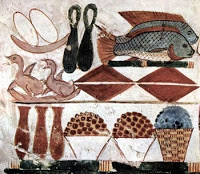
Over the years I’ve written a lot of ancient Egyptian stories and one thing that pops up a lot is food. And as I’m a huge fan of eating (thank goodness for running!) I thought I would share with anyone interested what those poor Egyptians had to eat. (What?! No Nutella? Egads!)
It’s a good thing Atkins wasn’t around in the ancient world because the staples of the ancient Egyptian diet were bread and beer. Bread for the poor was coarse and often contained sand so most adults would have had pretty worn down teeth. Of course, the average life expectancy was somewhere around 35 so who cares if you’re losing your teeth at 20?
Workers on monumental projects were actually paid for their work with bread and beer as ancient Egypt was not a cash-based economy. The fellahin diet was supplemented with onions, (priests were forbidden to eat them due to their aphrodiasic qualities), garlic, leeks, and dried fish (Ummm… ick!). The poor rarely would have had the occasion to eat any other meat. The royal house, the rich, and the temples would have had access to beef, but that’s about it.
Veggies eaten included celery, radishes, cabbage, endive, cucumbers, and papyrus roots (those mostly eaten by the poor). Fruits included grapes, watermelon, apples, pomegranate, mulberry, and date palms. Pears, peaches, cherries, and almonds were introduced by the Romans. Tiger nuts, olives, lentils, peas, and other beans were also eaten, although the Greeks once reported that Egyptians refused to sow beans because they found them unclean. They have been found in numerous tombs so perhaps that’s just another case of Herodotus being off the mark.
The rich would have enjoyed access to beer, wine, much finer breads (no sand!), water fowl, melons, raisins, dates, figs, onions, lettuce, and other veggies. Their foods would have received such spices as dill, coriander, cumin, cinnamon, and rosemary. Honey was also very popular as a sweetener and vinegar was also used in cooking.
Whew! There you have it- tons of foods to populate any future eating scenes.
Anyone have some papyrus roots I can munch on?

Herodotus does rather like to generalise, but he might not be totally wrong. Diodorus on the same subject says some Egyptians wouldn't touch beans, and others avoided other foods:
That the Egyptians have adopted these customs for themselves because of the advantage accruing therefrom to their life is clear to all from the fact that there are those among them who will not touch many particular kinds of food. Some, for instance, abstain entirely from lentils, others from beans, and some from cheese or onions or certain other foods, there being many kinds of food in Egypt, showing in this way that men must be taught to deny themselves things that are useful, and that if all ate of everything the supply of no article of consumption would hold out. But some adduce other causes and say that, since under the early kings the multitude were often revolting and conspiring against their rulers, one of the kings who was especially wise divided the land into a number of parts and commanded the inhabitants of each to revere a certain animal or else not to eat a certain food, his thought being that, with each group of people revering what was honoured among themselves but despising what was sacred to all the rest, all the inhabitants of Egypt would never be able to be of one mind. And this purpose, they declare, is clear from the results; for every group of people is at odds with its neighbours, being offended at their violations of the customs mentioned above.
I seem to recall btw the recipe for Hittite beer is known. I suppose it would be close to Egyptian?
Interesting piece from Diodorus, Gary. I hadn't read that one, but it's good food for thought. (Sorry- I couldn't resist!)
I believe the Hittite beer would be very close to Egyptian. They have also recreated ancient Egyptian bread based on a bakery at the City of the Pyramid Builders and tomb scenes of bakeries. When I went to a lecture given by Mark Lehner, the archaeologist in charge of the project he said it was something akin to hardtack. Blecch.
Wow! I would love to talk to you for HOURS about the Egyptians. I know I'm not alone here, but they are one of my favorite ancient cultures.
I'm really interested in your WIP if it's about Hatshepsut. I'll have to go through your blog archives and educate myself 🙂
Thanks for following me, I'm returning!
Word Veri: Mindifie: what will happen to me from following your blog.
I'm obsessed with ancient Egypt! My first run-in with Hatshepsut was in 8th grade and I've been hooked on her ever since.
That should probably feature in an upcoming blog post! 🙂
Mindifie- I like that. My goal should be to mindifie all my readers!